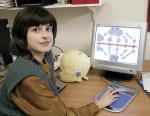Adelaide cancer breakthrough
 Cancer Research Cancer Research
A University of Adelaide physicist has made a significant breakthrough on the treatment for inoperable head and neck tumours - one of the most aggressive forms of cancer. Dr Loredana Marcu, a radiobiology lecturer in the School of Chemistry and Physics, has established that daily doses of the drug cisplatin, used in combination with radiotherapy, are the most effective treatment schedules for these tumours, which account for 15% of all cancers. Those at risk are smokers and heavy drinkers aged over 50. The prognosis is grim due to the aggressive growth of the tumours and their resistance to radiation. Dr Marcu used virtual computer modelling techniques to simulate tumour growth, starting from a single stem cell and including all biological parameters. Her modelling work focused on unresectable tumours, which cannot be surgically removed but must be treated with chemotherapy and radiotherapy. "The aim of the modelling was to set biologically realistic parameters for head and neck tumours and try to find the optimum treatment schedule, which is one of the biggest challenges facing oncologists," Dr Marcu said. "I grew a virtual tumour and combined both radiotherapy and chemotherapy, concluding that daily doses of the drug cisplatin are more effective than administering it weekly, which is the current form of treatment. "Head and neck tumours are rapidly proliferating tumours, which actually accelerate once treatment has started. During treatment when they realise they are losing cells, they respond by growing more rapidly, making them extremely difficult to treat. "Also, 30% of head and neck tumour cells are hypoxic (lacking in oxygen) and thus resistant to radiation. This presents a tough challenge for oncologists." Dr Marcu said international trials of the drug cisplatin had proved inconclusive in the past. "Unfortunately, there is a lack of factual data in the radiobiology field which makes it difficult to determine optimum treatment schedules for different conditions. I wanted to do some research that corrected this." Another stumbling block for oncologists is the refusal of most head and neck tumour patients to comply with treatment conditions. "The majority won't give up smoking during the course of the treatment. Experimental data shows that tobacco can reduce the oxygenation level of cancerous cells by another 30%, yet even this doesn't act as a deterrent." Dr Marcu said virtual modelling offered great potential for health research because it could be adapted to suit new parameters. "Modelling is an important tool for oncology and cancer research because you can continue to update the model when new information becomes available." Story by Candy Gibson
|





